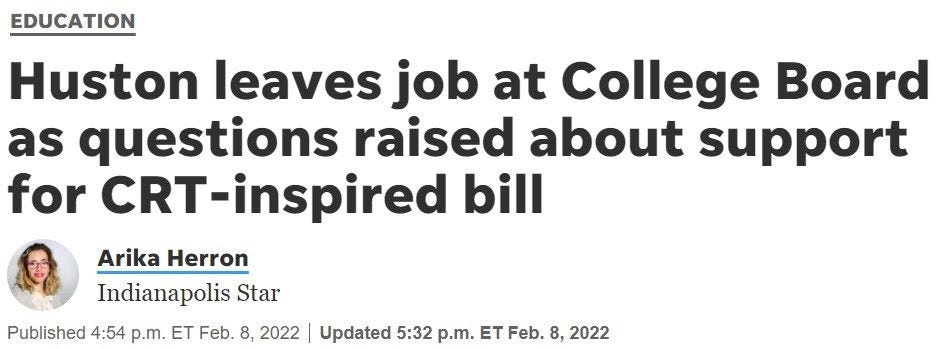UPDATE: Indiana's anti-CRT bill defeated
This year, Popular Information has reported extensively on legislation in Indiana that attempts to ban "Critical Race Theory" and related concepts in K-12 education. It appeared inevitable that the bill would pass Indiana's legislature, which is dominated by Republicans, and become law. But instead, the bill was killed this week by the Indiana Senate. Senate President Rodric Bray (R) said "he didn't have the votes."
What happened?
The trouble started in January during a Senate Education Committee hearing on the legislation. During the hearing, Indiana history teacher Matt Bockenfeld testified regarding a requirement in the bill that teachers "remain impartial in teaching curricular materials." Bockenfeld said he was teaching "the rise of Nazism right now" and "we're not neutral on Nazism. We take a stand in the classroom against it, and it matters that we do."
State Senator Scott Baldwin (R), the author of the bill, replied that he believed Bockenfeld and other teachers had an obligation to be "impartial" when discussing Nazism. “I believe that we've gone too far when we take a position on those isms... We need to be impartial,” Baldwin said.
Bockenfeld told the Indianapolis Star that he was "shocked" by Baldwin's comment and he will "oppose Nazism until they fire me." Baldwin, facing an avalanche of criticism, partially backtracked, saying he "failed to adequately articulate" his point. The Senate Education Committee, however, decided not to move forward with its plan for a vote later that week.
The engagement of teachers like Bockenfeld, explaining the practical impact of anti-CRT legislation in the classroom, played a critical role throughout the legislative process.
The legislation, however, was revived by the Indiana House. It was quickly approved by the House Education Committee and prioritized for a floor vote by House Speaker Todd Huston (R). The Indiana House approved the bill by a vote of 60-37 on January 26. (There are 71 Republicans in the Indiana House.)
On February 7, however, Popular Information reported that Huston, in addition to his role as speaker, was paid $460,738 annually to serve as the College Board's Senior Vice President for State and District Partnerships. The College Board, which designs the SAT and Advanced Placement (AP) courses, has an enormous influence on what is taught in high schools across the country. The report noted that Huston's role at the College Board directly conflicted with his role advancing legislation that limits "what teachers can say regarding race, history, and politics in Indiana classrooms."
The bill would effectively ban teachers, including AP teachers, from including diverse materials that would appeal to underrepresented communities. If the bill became law, it would be difficult, for example, for an AP Literature teacher to include works by James Baldwin that include candid discussions of race and societal responsibility.
On February 8, the College Board announced it was parting ways with Huston. The Indianapolis Star picked up the story and noted that the College Board's decision came one day after "independent journalist…Judd Legum published a story questioning [the] College Board’s employment of Huston amid the speaker’s support for HB 1134."
Still, the bill was not dead. It had already passed the House and had been referred to the Senate Education Committee.
The Senate Education Committee attempted to defuse growing public opposition by watering down the legislation. It removed "language that would have allowed parents to sue school districts and included a pathway to revoke an educator’s teaching license." And it cut down the list of "divisive topics" from eight to three.
Still, when the Committee held a public hearing, 200 people showed to speak. The Committee chairman cut off the proceedings after two hours and only three dozen people were given an opportunity to talk. Nevertheless, the Committee voted to approve the amended bill on February 23 on a vote of 8 to 5.
But the bill was left with little support in the Indiana Senate. Some Senate Republicans still thought the bill was "was too much of a burden on education and just not good policy" and others now believed it "didn't go far enough." Bray, who said he personally supported the bill, pulled the plug.
The bill's failure "is a reminder of the wrongheadedness of educational gag orders and of the power of citizens to speak out against them," Jonathan Friedman, Director of Free Expression and Education at PEN America, told Popular Information. "For those fighting these bills in other states, take note: public engagement can make a difference."
Popular Information is an independent media outlet grounded in the belief that public scrutiny of important issues can create meaningful change. Although we are just a three-person operation, we've proven that our work can have an impact.
But there are other important stories that, right now, we simply don't have the bandwidth to investigate. You can help expand our capacity to create change with a paid subscription.
If the cost of this newsletter ($6/month or $50/year) would create any kind of financial strain, please join the free list. We’ve taken down the paywall because we want everyone to have access to this information.





Thank you for this, Judd, and for ALL that you do. You help keep me from the bottomless pit of despair.
Great work Judd!